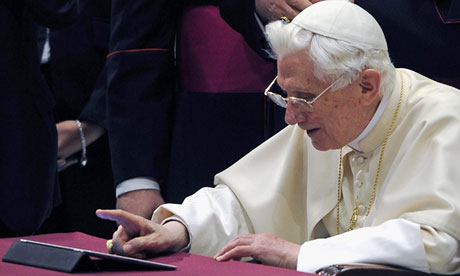Kassie facebooked me the news this morning before I had even kissed my kids good morning and turned on the coffee pot. I thought at first that she must be wrong, there could simply be no way Papa B would bow out. But as I scrolled through Facebook and Twitter, the kids clamoring for breakfast, toast burning, milk forgotten on the counter, I started to feel like one does after a swift, hard punch to the gut. Like I couldn’t breathe, couldn’t stand up straight, couldn’t take it in.
Pope Benedict is the only Pope I’ve ever known. Coming from a Protestant background, “in persona Christi” is an entirely foreign and much-despised concept. Who needs someone to be Christ for us when we have Christ in our hearts and the Holy Spirit to guide us? Well, I did. I couldn’t ever figure out what the Bible meant, and half of what I thought it meant seemed pretty heinous to me. Reading the Bible became, in my latter years of Protestantism, a form of self-torture. I started to hate the God of the Bible, because I couldn’t understand him or some of the awful things he said. My own interpretations were limited by my limited understanding of…everything. I wanted to believe, but I didn’t know how.
The Church unfolded before me gradually, starting with my friends, then teachers, the Mass, my godparents, my in-laws, and then that dear, beloved Cistercian. After my official conversion, the outer reaches of the Church began to open up for me. Bishops who wrote books and priests who blogged. Ignatius Press. George Weigel. First Things. The Anchoress. And Benedict XVI.
I had heard that he was “tenacious”, like a bulldog, a “conservative powerhouse” who would be “a champion for the return to orthodoxy.” But what I saw was a gentle, intelligent, humble man who astounded me above all with his love. His love for the Anglicans, the SSPX, the Eastern Orthodox churches. His love for the poor, the ill, the oppressed, the downtrodden, the disenheartened. And just in the last year, his love for my generation, my peers, in my country, in this time. He didn’t brush off the burgeoning world of the internet as irrelevent, but encouraged us to embrace it by embracing it himself. The whole world watched with something like a collective suspension of disbelief as the Pope Tweeted. It was truly remarkable. It is truly remarkable, to have the Pope’s words show up in my Twitter feed. To read a letter he wrote aimed specifically at bloggers and social-media users like me. To see the Pope be in persona Christi…not pontificating from his golden throne in the Vatican, but braving the hatred and abuse of the tweeting masses to say something to me.
Papa B, my Pope, has shown me what “in persona Christi” really means. It doesn’t mean always being right, inexorably driving the heathens back to orthodoxy or out the door, or rescuing the Church from the abysmal desecration of Vatican II. It means loving us, no matter who we are or where we are. He got on Twitter to meet us where we are. We’re not in Vatican City. We’re not filling up churches and cathedrals. He knows that. So, like Christ, he came to us.
The potential loss of that is what I felt so keenly this morning. In the end, it isn’t a great champion of Truth who will vocally drive away all dissenters and restore the Church to glory. It’s a man who comes to us humbly, and loves us even though we’re tweeting instead of going to Mass. Like Christ did.
I have faith in the Church, and even though it will be particularly difficult for relatively new converts like me to weather the changing papacy, I trust that it is for the best. But I will miss this Pope who with his tweets and letters serves as a reminder of what it truly means to be in persona Christi.











